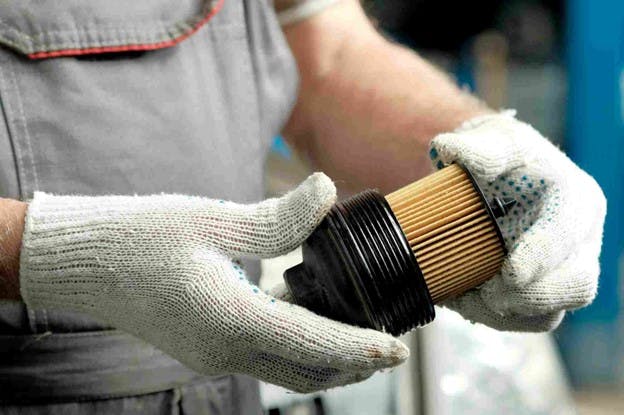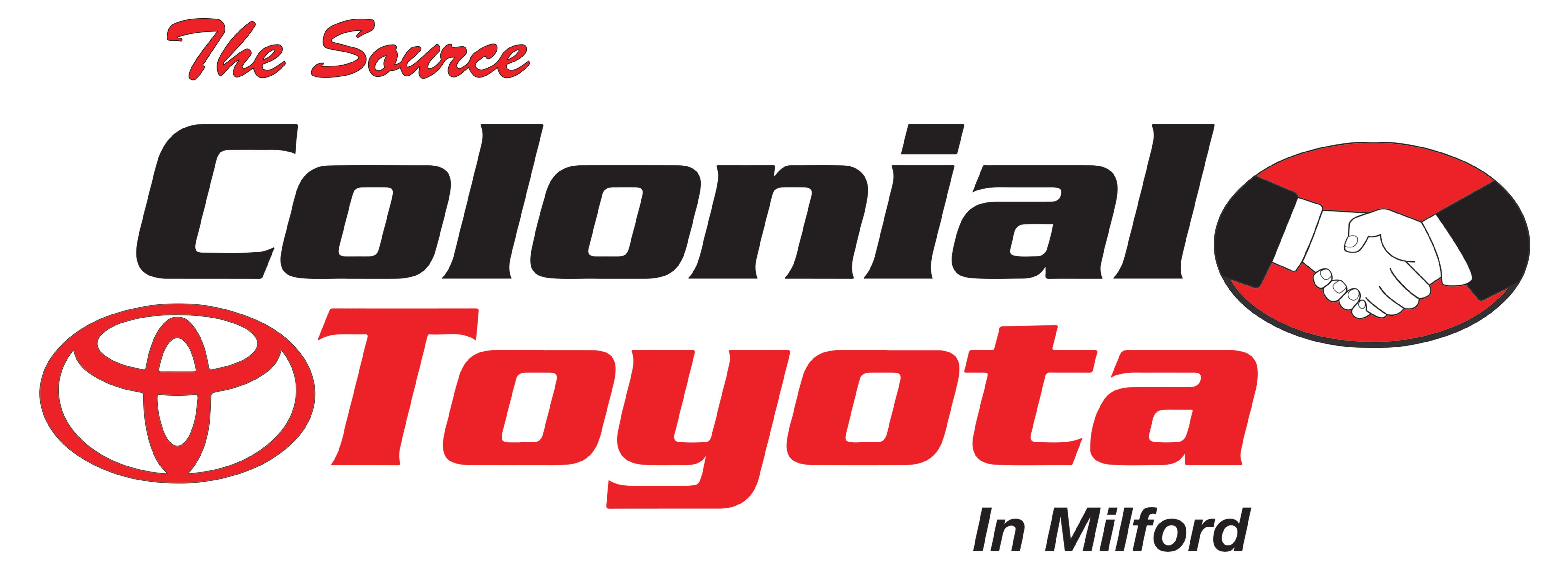Role of Toyota Oil Filters in Engine Health
Engine Longevity Enhancement in Milford, CT
Once you have made an investment in a new Toyota, you likely want to do everything you can to maintain your investment. Taking care of your vehicle can reduce your risk of costly and dangerous problems, save you money on vehicle repairs, and reduce your risk of a breakdown. Certain vehicle maintenance tasks can even extend the lifespan of your vehicle’s engine. At Colonial Toyota, we understand the importance of engine longevity enhancement in Milford, Fairfield, Westport, Norwalk, Danbury, Orange, Woodbridge, Ridgefield, Trumbull, Easton, Monroe, Bridgeport, Stratford, West Haven, New Haven, CT, and the I-95 corridor area. We specialize in routine, express, and preventive maintenance for Toyotas, including lubrication system protection and replacement oil filters. Call to schedule an appointment to have your oil level checked or your oil filter replaced.

Role of Toyota Oil Filters In Engine Health
Your vehicle’s oil filter plays a crucial role in the health and longevity of your vehicle’s engine. Oil filters offer contaminant removal. They filter out particles, dust, dirt, debris, and other contaminants that could put excess wear and tear on your engine, affect its safety and performance, or decrease its lifespan. Your oil filter has pleats that catch and trap these contaminants so they never make their way back into the engine. Using the right motor oil and regularly checking and replacing your oil filters are the two most important elements of your vehicle’s lubrication system protection. Let’s take a closer look at what oil filters are, what they do, and how they benefit your vehicle.
What Is an Oil Filter & How Does It Work?
An oil filter is a specialized filter that removes impurities and contaminants from your motor oil before it reaches your vehicle's engine. Your vehicle's engine oil lubricates the functional parts of the engine and helps cool the engine. During combustion, waste particles like dirt and sand get mixed in with the engine oil. This contaminates the oil and affects its viscosity. If the oil doesn't work as well, there is increased friction and wear and tear on your engine, and your fuel consumption is increased. Over time, this will shorten the lifespan of your vehicle's engine. The oil filter traps particles and contaminants that could affect the performance of the motor oil and engine. A high-quality oil filter will remove almost all contaminants from your engine oil, including dirt, dust, debris, and metal particles. This extends the lifespan of your engine and maintains optimal engine performance.
How Do Oil Filters Affect Engine Performance?
Oil filters have a huge effect on your vehicle’s engine performance. Your oil filter maintains the optimal level of cleanliness and engine lubrication to support the ideal performance of your engine. If you have a clogged or dirty oil filter, more contaminants will get to your engine. This can restrict oil flow and lead to decreased engine performance. Clogged oil filters are not very good at removing impurities from motor oil. These impurities will cause excess wear and tear on your engine and decrease its lifespan. Dirty oil may also make your vehicle’s engine run hotter, which can also decrease its performance and cause major damage. Clogged oil filters can even restrict the flow of oil to the engine, causing issues with engine lubrication. Engine lubrication problems cause increased friction and heat, which means the engine has to work harder. Eventually, this will cause decreased engine performance, increased wear and tear, and potential damage to your vehicle's engine.
What Kind of Oil Filter Does Your Toyota Need?
Your owner’s manual should tell you what specific Toyota oil filter your vehicle needs. You can also check the Toyota parts website or ask your service technician. Here are some of the most common Toyota oil filters:
- Corolla, Corona, Starlet, Van 2wd, Van 4wd, Starlet 4wd, Manual Trans – Toyota Oil Filter Part Number: 15601-33021
- Scion tc, xB; Camry, Celica, Corolla, Echo, Highlander, Matrix, MR2, RAV4, Solara – Toyota Oil Filter Part Number: 90915-YZZF1
- Scion FR-S; Toyota 86 – Toyota Oil Filter Part Number: 90915-YZZS1
- GR Supra – Toyota Oil Filter Part Number: 04152-WAA03
- Land Cruiser, Sequoia, Tundra – Toyota Oil Filter Part Number: 04152-YZZA4
- 4Runner, FJ Cruiser, Tundra – Toyota Oil Filter Part Number: 04152-YZZA5
- Scion iM, xD; Toyota C-HR, Corolla, Corolla iM, Matrix, Prius, Prius Plug-In, Prius Prime, Prius V – Toyota Oil Filter Part Number: 04152-YZZA6
Should You Get a High-Quality Toyota Oil Filter?
Low-quality oil filters can affect your engine’s performance as much as low-quality motor oil or a clogged or dirty oil filter. Choosing the cheapest oil filter or installing an aftermarket oil filter means that the oil filter may not be as effective at removing impurities from the oil. It may also get dirty or clogged more quickly. When you use a high-quality OEM Toyota oil filter, you are guaranteed longevity and performance. Toyota air filters undergo rigorous testing and strict quality control measures to ensure they work safely and effectively. They are designed to fit perfectly in your specific make and model of Toyota vehicle. When you install high-quality Toyota oil filters, you will not violate your vehicle warranty. You will decrease your risk of engine performance issues, extend the lifespan of your engine, and reduce the level of impurities that make it to your engine.
How to Check Your Oil Filter
If you suspect a problem with your engine oil filter and want to check if it is damaged, dirty, or clogged, you should check your owner's manual for instructions. In general, this is how to check your oil filter on a Toyota:
- Prop up the front end of your vehicle with jack stands.
- Remove the oil drain plug and let all of the oil drain out.
- Locate the oil filter underneath the engine, near the front of the vehicle.
- Take out the filter and inspect it for signs of damage, degradation, or clogs.
If you have a problem with your oil filter, we recommend bringing your vehicle to a certified Toyota dealership service center. The technicians will check your oil levels and oil filter and determine if they need to be changed.
Signs You Need a New Oil Filter
Sometimes, an oil filter doesn’t last as long as it should, especially if you install a low-quality or aftermarket oil filter. If you notice these signs you need a new oil filter, bring your vehicle into a service center for an inspection:
- You are getting poor fuel efficiency.
- You have noticed decreased engine performance.
- Your vehicle’s maintenance light is on.
- The engine oil looks thicker and darker than usual.
- Your engine keeps overheating.
- The exhaust fumes look dirty.
- Your engine oil pressure has decreased.
- Oil is leaking from your car.
- You hear a knocking or ticking noise while driving or when you first turn your vehicle on or off.
- The vehicle’s ‘check engine’ light is on.
When & Why You Should Replace Your Oil Filter
You should replace your oil filter at the time of each oil change. However, if you notice signs that there is a problem with your oil filter, you should take your vehicle to a service center to have your oil filter inspected. Your service center technicians should also check your oil filter and oil levels at every regular service appointment. Replacing your vehicle’s oil filter will:
- Enhance filtration of impurities from your motor oil.
- Reduce the risk of increased friction and heat on the engine.
- Reduce wear and tear and damage to the engine.
- Extend the lifespan of the engine.
- Prevent oil from draining back into the engine when your vehicle is off.
- Maintain optimal engine performance.
- Improve fuel efficiency.
- Reduce vehicle maintenance and vehicle repair costs.
- Improve the safety of your vehicle.
Preventive Maintenance Benefits of Oil & Oil Filter Changes
Regular oil changes and oil filter changes are a key part of your vehicle's preventive maintenance. Preventive maintenance tasks are ones that you do to protect your vehicle from future problems like damage, wear and tear, and breakdowns. Being proactive about your vehicle's maintenance also allows your service center technician to catch early warning signs of a problem that would get bigger and more expensive over time. Taking care of vehicle maintenance before you're aware of a problem with your vehicle can save you time and money and help you avoid stress.
Schedule an Appointment for Oil Quality Maintenance
If you’re not sure when your vehicle last had an oil change or an oil filter inspection, our team at Colonial Toyota can help. Our highly skilled and trained Toyota service technicians have extensive experience inspecting Toyotas of all makes and models and making fast, accurate diagnosis of problems. We will always look for the fastest and most effective solution to any issue you're having with your vehicle. We offer routine and preventive maintenance services, including oil changes and fluid replacement services, and OEM replacement parts for your Toyota, including oil filters, cabin air filters, engine air filters, tires, and wiper blades. We also specialize in Toyota service and repair, including collision repair for Toyotas in Milford, Fairfield, Westport, Norwalk, Danbury, Orange, Woodbridge, Ridgefield, Trumbull, Easton, Monroe, Bridgeport, Stratford, West Haven, New Haven, CT, and the I-95 corridor area. Call us today or contact us online to schedule an appointment for oil quality maintenance in Milford, CT, at our Toyota dealership service center.


